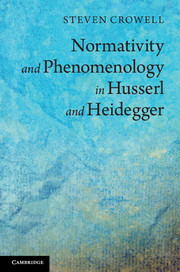Book contents
- Frontmatter
- Contents
- Acknowledgments
- Citation conventions for the works of Husserl and Heidegger
- Introduction
- Part I Transcendental philosophy, phenomenology, and normativity
- Part II Husserl on consciousness and intentionality
- Part III Heidegger, care, and reason
- 8 Subjectivity
- 9 Conscience and reason
- 10 Being answerable
- Part IV Phenomenology and practical philosophy
- References
- Index
8 - Subjectivity
Locating the first-person in Being and Time
Published online by Cambridge University Press: 05 April 2013
- Frontmatter
- Contents
- Acknowledgments
- Citation conventions for the works of Husserl and Heidegger
- Introduction
- Part I Transcendental philosophy, phenomenology, and normativity
- Part II Husserl on consciousness and intentionality
- Part III Heidegger, care, and reason
- 8 Subjectivity
- 9 Conscience and reason
- 10 Being answerable
- Part IV Phenomenology and practical philosophy
- References
- Index
Summary
Introduction
It is the chief task of philosophy of mind to provide an account of intentionality. What this amounts to can be variously formulated: how is it possible that consciousness is consciousness “of” something? How can our mental states have “content”? What accounts for the “as-structure” of our experience? And so on. How one formulates the question is already the outline of an answer, and so debates in philosophy of mind are inseparable from decisions about broader questions of philosophy. One such decision concerns the ontology of, as Heidegger puts it, “the entity which is intentional” (GA 20, p. 152/110). John Haugeland has usefully distinguished between “right-wing” (or individualist) and “left-wing” (or socialist) theories of this entity. Individualist positions, broadly Cartesian in orientation, tend to link the question of intentionality quite closely to aspects of the first-person stance. As we saw in Chapter 5, for such theories content is either “in the head,” and then some plausible account of how such content can deliver the world as it purports to do must be given; or else “meaning just ain’t in the head,” in which case the task is to explain the relation between so-called “wide” and “narrow” content, or why I sometimes seem authoritatively to know what I am thinking about (first-person authority). Socialist positions, in contrast, emphasize the activities of the entity who is intentional, arguing that the as-structure of experience is tied to the normativity inherent in social practices and has little or nothing to do with the mental in the Cartesian (and broadly psychological) sense stressed by the individualists. For these theorists, first-person authority is either denied outright (Wittgensteinian behaviorism) or else relegated to a non-explanatory role.
- Type
- Chapter
- Information
- Normativity and Phenomenology in Husserl and Heidegger , pp. 169 - 190Publisher: Cambridge University PressPrint publication year: 2013



